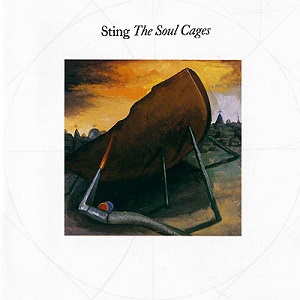(#420: 2 February
1991, 1 week)
Track listing: Island
Of Souls/All This Time/Mad About You/Jeremiah Blues (Part 1)/Why Should I Cry
For You/Saint Agnes And The Burning Train/The Wild Wild Sea/The Soul Cages/When
The Angels Fall
In 1974 Alan Price released the album Between Today And Yesterday, which was divided halfway between songs looking
back at growing up in and around Newcastle and
reflections on what it meant to be a Geordie in seventies Britain.
Stylistically the “yesterday” songs owe much to music hall and pre-war Palais
dance bands, while the “today” songs veer towards jazz and blues but are still
squarely in the mid-seventies. Watching over both is the spirit of Randy Newman
– the album could almost be Price’s Good Old Boys and at times the songs’
outward merriment cunningly disguises their inner bleakness: “I’m asking you to
give us time,” announces Price at the beginning of “Left Over People,” “And
listen to this tale/With particular rrrr-regard (he rolls his “r”s as angrily
as Lydon would do a couple of years later)/For folks whose lives are for sale.”
Probably the record’s most famous piece is “Jarrow Song,” a superficially
jaunty top ten single which more or less calls for armed insurrection. Price
finally finds himself marooned by the present, realising that in forty years
nothing has changed with no lessons learned. The title song, which ends the
record, is as quietly apocalyptic album-closer as Newman’s “God’s Song (That’s
Why I Love Mankind).” “Between today and yesterday is like a million years,”
Price sings, gloomily, “And the only truthful man he’s seen was standing there
in tears.” He ends the song, and the record, with a terrible gesture of tactful
finality: “Enough – I said enough – just
draw the shades/Please let me drink black wine.”
The record’s resonance in 2016 cannot be over-emphasised, of
course, but a great part of why it works is because it’s so selfless and knows
its own limitations; there is no attempt at a storyline to link any “concept,”
and Price’s band are all reliables (Colin Green, Dave Markee, Clive Thacker,
with Derek Wadsworth doing the horn and string arrangements) who remain at the
service of the music and do not ramble.
It is a record which almost certainly would have been heard
and absorbed by the younger Sting. But The
Soul Cages proves he learned no lessons from it. Instead of economy, there
is endless noodling – a particular offender is guitarist Dominic Miller, who
reels off every page of the Ladybird
Bumper Book of Rock Guitar Clichés available to him – and the concept,
while obviously heartfelt (as far as paternal-related grief in rock goes, it’s
preferable to “The Living Years”), is so ponderously and ineptly realised that
all you hear finally is the sound of money being spent on the part of a group
of people who imagine it is still the eighties. The presence of Hugh Padgham as
co-producer was nigh inevitable.
For all Sting’s talk of proud Newcastle and the Tyne and big
ships – the story gets rather silly towards record’s end with the sub-Moby Dick fantasia/shaggy dog tale of the
title song – we are not really allowed to forget that this was an album
recorded in expensive studios in Paris and Italy. Even the instrumental “Saint
Agnes” is a flimsy affair which might as well soundtrack a daytime television
programme about instructional macramé
in Budapest.
Throughout he is at pains to retain his “King Of Pain” status – an alternative
title for many of his albums could be It’s
All About You, Sting, Isn’t It? – and the expensive musicians at his disposal
do their best to make the music interesting (particularly Branford Marsalis and
Kenny Kirkland in the “free” interludes of “Jeremiah Blues”). The closing “When
The Angels Fall,” in which Sting takes nearly eight very long minutes to make
his mind up about mourning the past or deciding that the North will rise again,
highlights the record’s central problem, in that it is the audio equivalent of
those travelogues you get on television, hosted by once dangerous people, or
people who acted dangerous, but have since been ironed out to docile compliance
– Michael Palin, Billy Connolly, Adrian Edmondson and so forth. Or this could
simply be a very long prototype for Who
Do You Think You Are?
Either way, as a representation of where someone from the North-East
stands in relation to the world in which they find themselves, it falls a very
long way behind Alan Price, and certainly Paddy McAloon – I wonder if Sting
ever had it in him to create a song as simultaneously ambiguous and
heartrending as “Nightingales.” But then McAloon is a genius who has never made
a bad record, whereas Sting fatally thinks
he’s a genius. He’s a would-be Renaissance man who once upon a time would have
been lucky to have been a roadie for Renaissance. Perhaps the most telling
comment on The Soul Cages comes from drummer
Manu Katché, who bravely tries throughout most of the record’s forty-eight
interminable minutes to render the music into something resembling compelling –
at the end of a seemingly unending fadeout to “When The Angels Fall,” he brings
proceedings to a close by a loud and meaningful drum tattoo, as if to say “Sting,
shut the fuck up.” If only someone other than Stewart Copeland had said that to
him before.



